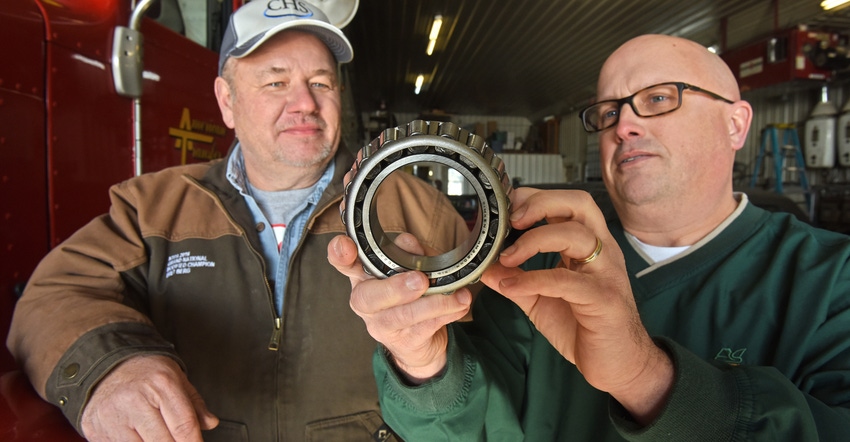May 18, 2020

Technology is being applied to a wide range of practices in agriculture, including grease. No matter your machine’s age, choosing the right grease can extend life and even save you time in the field.
“Well, grease is one of those things producers overlook,” says Mimi Falkman, senior marketing specialist, CHS Lubricants. “Oil is at the top of their list because they feel it offers an immediate return by prolonging the life of their equipment.”
That simple tube of grease you pop into the gun to apply to nipples to fill bearings and protect bushings isn’t so simple these days. “If you think about it, grease can help their operation be more efficient, and it can extend the life of equipment,” she says.
The role of grease is to protect critical components. Every 12-year-old helping Mom or Dad on the farm knows that. But grease also keeps dirt and moisture from seeping into bearings and bushings, which can cause corrosion. That’s the very basic role of grease on a piece of equipment. However, today’s equipment works faster — and in the heat of the moment is probably under more stress than in the past.
Falkman says the right grease can even save you time in the field, because it helps protect critical components during severe stress situations. “Equipment is under a lot of stress and needs to be greased often,” she explains. “But by using a high-quality product that is engineered to withstand tough conditions, you’ll have to stop less to grease; and that saves time.”
Falkman shares that not only is there a need to grease on a specific schedule, but also, that selecting the right type of grease for multiple needs is something to consider. “If you use a high-quality grease that will stay in place longer, you can avoid metal-on-metal contact, which reduces friction and decreases wear,” she adds.
Selecting grease
Just snatching a box of your favorite grease may not be the best choice — no matter if you’re at the friendly neighborhood cooperative or your favorite farm equipment dealer. Knowing what parts of each machine require specific kinds of grease can prolong equipment life.
The key is choosing the right grease for the application. Constantin Madius, commercial product manager, Axel Americas LLC, a grease maker for a number of brands, notes that there’s not really a single grease that can do it all. “Depending on different applications, the pin and bushing of your machine, or the wheel bearings lubricated, or smaller close gearboxes, or even irrigation systems, we have a different performance level of grease.”
One area that offers enhanced performance is to select a grease that uses a synthetic oil base. “They can work in a wide temperature range where the product is suitable,” he says.
Madius notes that a lot of farmers look at high-temperature performance, but that synthetic oil-base grease can also do its job in the cold. “We are often focused on the high-temperature performance of synthetic greases, but the pour low points of synthetic oils increase the low-temperature performance of a grease as well,” he says.
Color, grease type and performance
Some farmers may have gotten hooked on a brand, and see that color in another grease and think they’re the same. “Color is not an indicator of performance,” Madius says. “That dye is put in so companies can differentiate their products. There’s no color convention for grease products. Not all blue products have the same performance.”
He adds that there is a perception that the stickier or “threadier” a grease is, the better it will perform. “That’s not necessarily true. You want the right amount of tackiness to help stay in place and help with water resistance, but this chewing-gum-like product shears down quickly when in use,” he warns.
As planting season winds down, Madius has some advice regarding grease and implements. “When you’re done, relubricate the grease points and store it with new, clean grease,” he says. And he advises unloading the bearing and pin and bushing when you grease for storage. That helps assure you’ve got grease in all parts of those areas on the machine.
He adds that grease knowledge is not as common as for oils, lubricants and hydraulic fluids. “Most of the time you have a specification you can lean against. Grease is still the part of the industry where you rely on knowledge acquired for a long period of time within the companies selling the product,” Madius adds. “Axel has been selling lubricant products for 130 years.”
The keys are knowing what you want to protect, and working with a reputable supplier to pick the right grease. “At CHS, we are constantly reevaluating our grease products to meet the needs of the farmer,” Falkman adds.
Maintaining machines of all ages may require a rethink regarding the grease you buy. A good starting point is that reputable dealer.
About the Author(s)
You May Also Like






